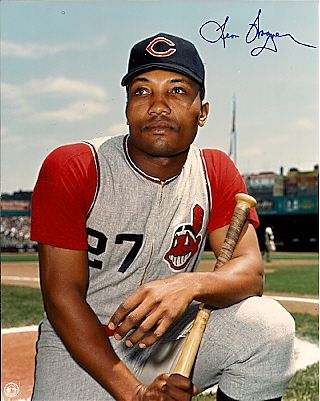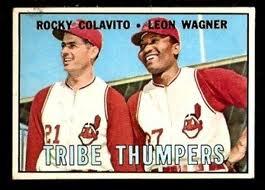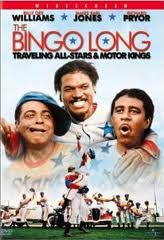 Leon Wagner remains a colorful favorite of middle-aged (elderly?) Cleveland Indians fans, from his four-plus seasons playing on the lakefront in the 1960s. He was a BSer who entertained sportswriters and made fans laugh.
Leon Wagner remains a colorful favorite of middle-aged (elderly?) Cleveland Indians fans, from his four-plus seasons playing on the lakefront in the 1960s. He was a BSer who entertained sportswriters and made fans laugh.
Not a politician-type of BSer. When complimented, he wouldn’t portray false modesty by saying he was ‘humbled’ by it. He was instead likely to smile and comment that he needed to be paid more.
The flip side of Wagner is the broader story of his life. It’s a classic, tragic story of a 20th Century entertainer. He was a larger-than-life character, full of pride and resolve. He enjoyed personal success, yet ultimately wrestled with personal struggles once the spotlight faded.
A large man with bright eyes and a contagious smile, Wagner was discovered by major league scouts while playing semi-pro ball on the sandlots of Detroit. He had already developed a distaste for laboring in a physically demanding automobile factory, and was eager to pursue a baseball career. A Cleveland scout had his eye on the 17-year-old Wagner. He spoke with the boy, and told him he’d send him a contract. That did not happen, and he was befriended by a Philadelphia Phillie scout. The scout was intrigued, but told Wagner he was going to refer him to the New York Giants- as a ‘colored’ player, he’d have an easier time latching on there (Wagner was also part Cherokee).
Leon Wagner was a free-swinging, left-handed pull hitter with power. He could also steal some bases. ‘Baseball men’ wanted to see him only swing at pitches around the strike zone (and strikeouts carried a stigma in those days). He had a ‘spread grip’ on the bat (with his hands a couple inches apart, a la Ty Cobb), which nobody tried to mess with much. His natural batting stance included a wiggle of his behind and a kick of his front leg as the pitch arrived- although throughout his career, he was inclined to try different batting stances depending on his mood. There was one for a 'happy mood', one for an 'unhappy mood', one for a ‘hittin’ mood’, one for a ‘doubtful mood’… Wagner would also assume the stance of other players and show them he could hit his way, or their way! The constant was that he swung hard, every time.
Even though he was known as a slugger, Wagner was a line drive hitter who credited his habit of swinging down on the ball to his days as a young child growing up in Chattanooga, TN. When nobody was around to play ball with, he’d throw rocks in the air and hit them with his bat. He learned that since the rocks were falling, it was easier to hit them if he swung in a downward direction as well.
Scouts really wanted to see the young player improve his defense. He caught balls with one hand, which many then considered to be ‘showboating’. He felt his other hand would just get in the way. Some of his misadventures in the outfield became legendary: once, when a fair ball skipped into the bullpen near the foul line, he dove under the bench to retrieve it. He instead came up holding a paper cup- and threw it toward the infield! Another time, as a big leaguer, he was in a similar situation and the opposing players in the bullpen were looking at the wrong spot under the bench, decoying Wagner. By the time he found the ball, the hitter was crossing the plate for an inside-the-park home run.
But the athletic ability took over at times- he became known to be able to time fly balls and make leaping catches to rob home runs from opposing players.
So Leon Wagner broke into Baseball as a Giant, in San Francisco in 1958. He was stuck behind Willie Mays in the SF outfield. But Mays left a strong impression on Wagner- he was a role model for the young player long after they were teammates. Wagner was traded to the St. Louis Cardinals, where he was the heir apparent to Stan Musial. Musial’s place in the outfield remained secure, and Wagner was traded to the expansion Los Angeles Angels in 1961.
It was there at Chavez Ravine that he began to make a name for himself as a slugger who could hit upon waking up in the dugout (literally). And he made some wonder if he played left field while sleepwalking. Wagner's personality agreed with the LA lifestyle. He was the young star on a team of older, free-spirited veterans like pitcher Art Fowler and fellow youngsters such as shortstop Jim Fregosi. Wagner owned a 14-unit apartment building, three houses, and a store which sold an Italian-style line of fine clothes. One of the local disc jockeys, Chuck Mann, managed the store and came up with the line, "Buy Your Rags at Daddy Wags."
For the 1964 season, Daddy Wags was traded to the Cleveland Indians. Many thought the Angels did not get enough in return: first baseman Joe Adcock and pitcher Barry Latman. Various reasons were given for the Angels trading Wagner: He didn't like Chavez Ravine, where the right field fence was very deep and thus tough on left handed power hitters. He also was said to have owed the Angels money from the failure of the clothing store (Wagner had drawn advances on his salary to help pay for the store- and later lamented that all of his best customers “must have been nudists”). And, Angels general manager Fred Haney was said to have been tired of Wagner's candid comments about deserving more money to play for LA. Regardless, the trade was a betrayal in the eyes of Leon Wagner. He felt that he had put on a good show for them and the trade was a source of bitterness for the rest of his life.
Cleveland loved Daddy Wags. Tribe General Manager Gabe Paul actually had had discussions regarding acquiring him back in 1961, when he was with Triple-A Toronto and Paul was the GM of the Houston Colts. When the Indians traded Wagner to the White Sox in 1968, he said he didn‘t really want to leave. He had been the Tribe's best hitter, even though Municipal Stadium was not that much more accommodating to his game than Dodger Stadium. He hit 97 home runs for the Tribe during an era when that number made him a top slugger in the American League. He hit 31 homers in 1964.
 The town was drawn to Wagner's beaming, vibrant personality. Unlike some players, Daddy Wags was a grown man who smiled while playing a boys’ game. He would have been a 21st century PR agent's dream- if removed from an era when his race was perhaps more of a factor.
The town was drawn to Wagner's beaming, vibrant personality. Unlike some players, Daddy Wags was a grown man who smiled while playing a boys’ game. He would have been a 21st century PR agent's dream- if removed from an era when his race was perhaps more of a factor.
Jim "Mudcat" Grant, a Tribe pitcher in the ‘60s, has noted that black men were still relatively new to Baseball, and it was important that they were viewed as ‘good guys.' Daddy Wags fit the bill. Coming up through the minor leagues, Wagner won mostly-white crowds over in an era when the public microscope was focused on ‘colored players’. And Wagner had no problem answering fans who hollered at him. Once, a heckler was giving him a hard time. Wagner addressed him directly, asking why he was messing with him- did Wagner look like he was the heckler’s wife?
A scary episode during Leon Wagner's days with the Tribe unfolded in May of 1966 in Yankee Stadium. Roger Maris hit a short fly ball near the line in left, and as left fielder Wagner ran in for the catch, shortstop Larry Brown ran out. They cracked heads, and laid motionless on the warning track in foul territory. Leon Wagner suffered a mild concussion and was out for a couple games. Larry Brown suffered convulsions, and was bleeding from his ears, nose and mouth. He had sustained fractures all around his face, and had swallowed his tongue. He would credit trainer Wally Bock with saving his life. In the hospital later, Brown’s wife had to ask which patient was her husband- he was so beat up that she didn’t recognize him. That collision likely short-circuited Brown's baseball career (manager Birdie Tebbetts later said that for a time, Brown was the best shortstop in the American League).
Interesting note: Leon Wagner played in 163 regular season games – in a 162 game season- for the Cleveland Indians in 1964. This is because, due  to a now-obsolete baseball rule, if a tied ballgame was called due to rain after the fifth inning, the game would not count but the players' stats would.
to a now-obsolete baseball rule, if a tied ballgame was called due to rain after the fifth inning, the game would not count but the players' stats would.
After Leon Wagner's playing career, he had roles in some Hollywood movies. If you have not seen The Bingo Long Traveling All-Stars and Motor Kings, rent it sometime. Wagner plays Fat Sam, and the cast features Billy Dee Williams, Richard Pryor, and James Earl Jones. Williams is a black baseball star who puts a flashy team together to compete in the Negro National League during the Great Depression.
Williams tried to convince Wagner to stick with acting, but that did not happen.
Wagner eventually sold cars in Hawaii (he had played some ball there as well) and in San Francisco, but eventually succumbed to a spiraling battle with substance abuse, compounded by anger toward Baseball. He did acknowledge that others such as Angels owner Gene Autry had reached out to him, but Wagner's pride wouldn't allow himself the shame of accepting what he saw as charity. Leon Wagner died in 2004 at age 69 from natural causes. He'd been a homeless man on the LA streets where he had once been a rich professional athlete.
It’s a paradox: the player retires, has offers to earn a living in other ways, and seemingly throws them away out of bitterness. Mudcat Grant has used the analogy of early astronauts, who apparently had no fear until they had landed in the Pacific Ocean. Some retired athletes apparently have had the sense that they are similarly sinking…
In Cleveland, warm memories remain. Tribe fans fondly reminisce on the legendary figure with the booming bat, the beaming smile, and the joy of playing ball.
Thank you for reading. Next week: Blast From The Past: Tom Candiotti.